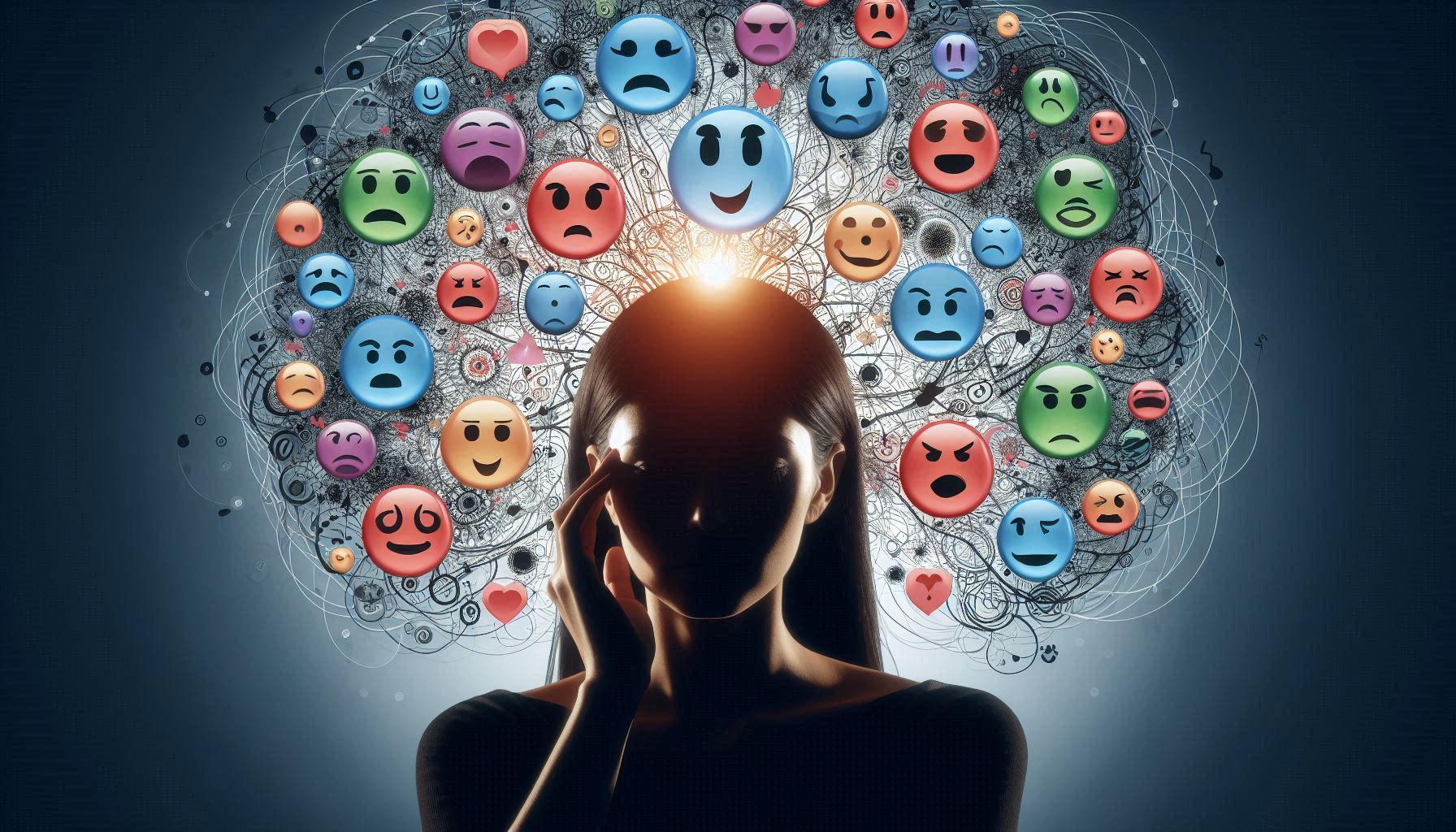Emotions are an integral part of the human experience, yet they often remain misunderstood or dismissed. While we may experience a whirlwind of feelings throughout our lives, understanding the hidden language of emotions can provide valuable insights into our mental well-being and personal growth. This article will explore the significance of emotions, how to interpret them, and the ways in which they guide us in navigating life’s complexities.
Understanding Emotions
Emotions are complex psychological states that involve three distinct components: subjective experience, physiological response, and behavioral or expressive response. They arise in response to internal or external stimuli and can significantly influence our thoughts, behaviors, and overall mental health.
The Function of Emotions:
Emotions serve several essential functions:
- Survival: Emotions like fear trigger our fight-or-flight response, helping us react quickly to threats.
- Communication: Emotions express our needs and intentions to others, fostering social connections and empathy.
- Decision-Making: Emotions inform our choices and judgments, often guiding us toward beneficial outcomes.
- Self-Reflection: Emotions provide insight into our values and desires, prompting us to reflect on our experiences and aspirations.
The Spectrum of Emotions:
Emotions exist on a spectrum, ranging from positive (joy, love) to negative (anger, sadness). Each emotion can be further categorized into primary emotions, such as happiness, sadness, anger, fear, surprise, and disgust, and secondary emotions, which are often more nuanced and complex, resulting from a combination of primary emotions.
The Hidden Messages of Emotions:
Emotions can be seen as a form of communication from our inner selves. Each emotion carries a message, offering insight into our experiences, relationships, and mental state. Here are some common emotions and their hidden meanings:
- Happiness:
- Message: Joy signifies that we are aligned with our values and desires. It often emerges in response to fulfilling experiences or positive relationships.
- Interpretation: When you feel happy, take a moment to reflect on what brought you joy. Recognizing these sources can help you prioritize activities and relationships that enhance your well-being.
- Sadness:
- Message: Sadness indicates loss or unmet expectations. It often serves as a signal to pause, reflect, and process our feelings.
- Interpretation: Embracing sadness can lead to healing. Allow yourself to grieve losses and acknowledge your feelings, as this can facilitate personal growth and resilience.
- Anger:
- Message: Anger often arises from perceived injustice, violation of boundaries, or frustration. It signals that something needs to change.
- Interpretation: Instead of suppressing anger, explore its roots. Understanding what triggers your anger can empower you to advocate for yourself and create necessary changes in your life.
- Fear:
- Message: Fear alerts us to potential threats or danger. It is a protective mechanism that helps us avoid harm.
- Interpretation: While fear can be paralyzing, it can also serve as a guide. Assess whether your fear is rational or irrational, and use it as motivation to confront challenges rather than shy away from them.
- Surprise:
- Message: Surprise can signify new information or unexpected changes. It prompts us to re-evaluate our understanding of a situation.
- Interpretation: Use surprise as an opportunity to learn. When faced with unexpected events, ask yourself what you can take away from the experience.
- Disgust:
- Message: Disgust often arises from perceived threats to our well-being or moral values. It serves to protect us from harm.
- Interpretation: Reflect on what triggers your disgust. Understanding your boundaries and values can help you navigate situations that feel uncomfortable or unacceptable.
The Interconnectedness of Emotions
- Emotional Overlap: Emotions are not isolated experiences; they often overlap and interact. For example, sadness can coexist with anger, or happiness can be tinged with anxiety. Recognizing this interconnectedness can lead to a deeper understanding of our emotional landscape.
- The Role of Cultural Influences: Cultural background plays a significant role in shaping how we experience and express emotions. Different cultures have unique emotional norms and values, affecting how individuals interpret their feelings and those of others. Being aware of these cultural nuances can enhance emotional intelligence and empathy.
The Science Behind Emotions
- The Brain and Emotions: Emotions are processed in various parts of the brain, primarily the limbic system, which includes the amygdala, hippocampus, and hypothalamus. The amygdala plays a crucial role in emotional responses, particularly fear and aggression, while the hippocampus is involved in memory formation and emotional context.
- The Mind-Body Connection: Emotions have a profound impact on physical health. Chronic stress, anxiety, and unresolved emotions can lead to various health issues, including cardiovascular problems, weakened immune response, and gastrointestinal disorders. Conversely, positive emotions can enhance overall health and well-being.
Developing Emotional Intelligence
Emotional intelligence (EI) refers to the ability to recognize, understand, and manage our own emotions and the emotions of others. It consists of four key components:
- Self-Awareness: Recognizing and understanding one’s own emotions.
- Self-Management: Effectively managing emotions in various situations.
- Social Awareness: Understanding the emotions and needs of others.
- Relationship Management: Building and maintaining healthy relationships based on emotional understanding.
Benefits of Emotional Intelligence
Developing emotional intelligence can lead to improved mental health, better relationships, and enhanced decision-making. High EI is linked to greater resilience, adaptability, and overall life satisfaction. It plays a critical role in fostering personal and professional success, enhancing relationships, and promoting overall well-being. Emotional intelligence (EI) offers numerous benefits that positively impact various aspects of life. Here are some key advantages:
- Improved Relationships: EI enhances communication and empathy, leading to healthier and more meaningful connections with others. People with high EI are better at understanding social cues and responding appropriately.
- Better Emotional Regulation: Individuals with strong emotional intelligence can manage their emotions more effectively, reducing instances of anxiety, anger, and frustration. This leads to more balanced emotional responses in various situations.
- Increased Resilience: High EI fosters resilience, enabling individuals to cope with challenges and bounce back from setbacks. This adaptability helps maintain mental well-being during stressful times.
- Enhanced Decision-Making: Emotional intelligence allows for better decision-making by integrating emotional information with rational thought. This results in more balanced and thoughtful choices.
- Greater Empathy: EI helps individuals develop a deeper understanding of others’ feelings and perspectives, promoting compassion and supportive interactions. This empathy is crucial in both personal and professional settings.
- Higher Job Performance: In the workplace, emotionally intelligent individuals tend to excel in leadership roles, teamwork, and conflict resolution. Their ability to navigate emotions contributes to a positive work environment.
- Improved Conflict Resolution Skills: EI equips individuals with the skills to handle conflicts more constructively, facilitating open communication and finding mutually beneficial solutions.
- Boosted Mental Health : By promoting emotional awareness and regulation, EI can reduce symptoms of anxiety and depression, leading to better overall mental health.
- Enhanced Personal Growth: Emotional intelligence encourages self-reflection and personal development, helping individuals understand their values, motivations, and areas for improvement.
- Better Stress Management: High EI individuals often employ effective coping strategies to manage stress, leading to a healthier response to life’s pressures.
Strategies for Enhancing Emotional Intelligence
- Practice Mindfulness: Mindfulness helps increase self-awareness by encouraging you to observe your thoughts and feelings without judgment.
- Journaling: Writing about your emotions can clarify your thoughts and feelings, aiding in self-reflection and understanding.
- Seek Feedback: Encourage trusted friends or colleagues to provide feedback on your emotional responses and interactions. This can enhance your social awareness.
- Engage in Active Listening: Practice fully engaging with others during conversations. This fosters empathy and strengthens relationships.
- Reflect on Emotional Triggers: Identify situations or events that provoke strong emotional reactions. Understanding these triggers can help you manage your responses more effectively.
Embracing the Language of Emotions
- Acknowledging Your Feelings: The first step in understanding the hidden language of emotions is acknowledging your feelings. Many people tend to suppress or ignore their emotions, which can lead to unresolved issues and mental health struggles. Embrace your emotions as valid responses to your experiences.
- Seeking Support: If you find it challenging to navigate your emotions, consider seeking support from a mental health professional. Therapy can provide valuable tools and insights for understanding and managing your emotional landscape.
- Creating Emotional Space: Cultivating emotional space involves allowing yourself time to process your feelings without judgment. This can be achieved through mindfulness practices, creative outlets, or simply taking moments of solitude to reflect.
The Impact of Emotions on Relationships
- Emotional Expression in Relationships: Healthy relationships rely on open communication and emotional expression. Being able to articulate your feelings fosters intimacy and understanding between partners, friends, and family members.
- Empathy and Emotional Understanding: Empathy, the ability to understand and share the feelings of others, is essential for building strong relationships. Practicing empathy enhances emotional connections and creates a supportive environment for everyone involved.
- Conflict Resolution: Emotions often play a significant role in conflicts. Understanding the emotions behind disagreements can lead to more effective conflict resolution. Instead of focusing solely on the issue at hand, consider the feelings driving the conflict to foster a more compassionate dialogue.
Importance of Emotional Intelligence
Enhancing emotional intelligence is crucial for personal fulfillment, effective communication, and overall mental health, making it an essential skill for navigating both personal and professional realms. Enhancing emotional intelligence (EI) is important for several compelling reasons:
- Improved Interpersonal Relationships: High EI helps individuals express themselves clearly and understand others, reducing misunderstandings and fostering healthier relationships.
- Better Conflict Resolution: Those with high EI can navigate conflicts more effectively, leading to solutions that consider everyone’s feelings and perspectives.
- Enhanced Self-Awareness: EI fosters greater awareness of personal emotions, helping individuals recognize triggers and patterns in their behavior, which is essential for personal growth.
- Increased Empathy: EI allows individuals to empathize with others’ feelings, leading to stronger connections and a more supportive environment, whether in personal relationships or the workplace.
- Greater Resilience: High EI contributes to resilience, enabling individuals to bounce back from setbacks and manage stress more effectively in challenging situations.
- Enhanced Decision-Making: EI helps integrate emotional insights with logical reasoning, leading to more thoughtful and balanced decisions.
- Boosted Mental Health: Improved EI is linked to lower levels of anxiety and depression, as individuals learn to manage their emotions and cope with stressors more effectively.
- Leadership and Team Dynamics: In professional settings, leaders with high EI can inspire and motivate teams, fostering collaboration and a positive workplace culture.
- Personal Development: Enhancing EI encourages a mindset of self-reflection and ongoing improvement, benefiting personal and professional lives.
- Life Satisfaction of Overall Well-Being: Individuals with high EI often report greater satisfaction in life, as they can navigate emotional challenges and maintain healthy relationships.
Conclusion
The hidden language of emotions is a powerful tool for self-discovery and personal growth. By learning to recognize, interpret, and embrace our emotions, we can gain valuable insights into our needs, desires, and values. Understanding the messages behind our feelings can enhance our emotional intelligence, improve our relationships, and contribute to overall well-being.
As we navigate life’s complexities, it is essential to honor our emotions as guides rather than obstacles. By flexing our emotional muscles and engaging with the rich tapestry of our feelings, we can foster resilience, empathy, and a deeper connection to ourselves and others. Embracing the hidden language of emotions can lead us toward a more fulfilling and authentic life, where we are not only aware of our feelings but also empowered by them.
SOURCES
Goleman, D. (1995) – Emotional Intelligence: Why It Can Matter More Than IQ. Bantam Books.
Goleman, D. (2001) – Emotional Intelligence: 10th Anniversary Edition. Bantam Books.
Mayer, J. D., Salovey, P., & Caruso, D. R. (2004) – Emotional Intelligence: Theory, Findings, and Implications. Psychological Inquiry.
Brackett, M. A., & Katulak, N. J. (2006) – Enhancing Emotional Intelligence: The Role of Emotional Literacy. Jossey-Bass.
Salovey, P., & Mayer, J. D. (1990) – Emotional Intelligence. Imagination, Cognition and Personality.
Bar-On, R. (1997) – Bar-On Emotional Quotient Inventory (EQ-i): Technical Manual. Multi-Health Systems.
Cherniss, C. (2010) – Emotional Intelligence: Key to Effective Leadership and Global Citizenship.” University of Southern California.
Wong, C. S., & Law, K. S. (2002) – The Effects of Leader and Follower Emotional Intelligence on Performance and Attitude: An Exploratory Study. The Leadership Quarterly.
HISTORY
Current Version
October 09, 2024
Written By:
BARIRA MEHMOOD



